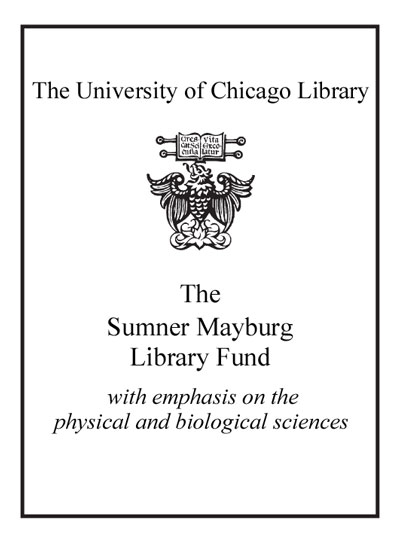Bioethics : an anthology /
Saved in:
| Edition: | 2nd ed. |
|---|---|
| Imprint: | Malden, MA : Blackwell Pub., 2006. |
| Description: | xvii, 738 p. ; 26 cm. |
| Language: | English |
| Series: | Blackwell philosophy anthologies ; 9 |
| Subject: | |
| Format: | Print Book |
| URL for this record: | http://pi.lib.uchicago.edu/1001/cat/bib/5987825 |
Table of Contents:
- Acknowledgments
- Introduction
- Part I. Before Birth
- Introduction
- Abortion
- 1. Abortion and Health Care Ethics
- 2. Abortion and Infanticide
- 3. A Defense of Abortion
- 4. Why Abortion is Immoral
- Mother-Fetus Conflict
- 5. Are Pregnant Women Fetal Containers?
- Part II. Issues in Reproduction
- Introduction
- Assisted Reproduction
- 6. The McCaughey Septuplets: God's Will or Human Choice?
- 7. Surrogate Mothering: Exploitation or Empowerment?
- 8. A Response to Purdy
- 9. The Right to Lesbian Parenthood
- 10. Rights, Interests, and Possible People
- Prenatal Screening, Sex Selection, and Cloning
- 11. Genetics and Reproductive Risk: Can Having Children be Immoral?
- 12. Prenatal Diagnosis and Selective Abortion: A Challenge to Practice and Policy
- 13. Genetic Technology: A Threat to Deafness
- 14. Sex Selection: The Case For
- 15. Conception to Obtain Hematopoietic Stem Cells
- 16. Why We Should Not Permit Embryos to be Selected as Tissue Donors
- 17. The Moral Status of the Cloning of Humans
- Part III. The New Genetics
- Introduction
- Gene Therapy and Eugenics
- 18. Questions About Some Uses of Genetic Engineering
- 19. Ethical Issues in Manipulating the Human Germ Line
- 20. The Moral Significance of the Therapy-Enhancement Distinction in Human Genetics
- 21. Should We Undertake Genetic Research on Intelligence?
- Genetic Screening and Counseling
- 22. Lessons from a Dark and Distant Past
- 23. Patient Autonomy and Value-Neutrality in Nondirective Genetic Counseling
- 24. Genetic Dilemmas and the Child's Right to an Open Future
- Part IV. Life and Death Issues
- Introduction
- 25. The Sanctity of Life
- 26. Declaration on Euthanasia
- Killing and Letting Die
- 27. The Morality of Killing: A Traditional View
- 28. Active and Passive Euthanasia
- 29. Is Killing No Worse Than Letting Die?
- 30. Why Killing is Not Always Worse - and Sometimes Better - Than Letting Die
- Severely Disabled Newborns
- 31. When Care Cannot Cure: Medical Problems in Seriously Ill Babies
- 32. A Modern Myth: That Letting Die is Not the Intentional Causation of Death
- 33. The Abnormal Child: Moral Dilemmas of Doctors and Parents
- 34. Right to Life of Handicapped
- Brain Death
- 35. A Definition of Irreversible Coma
- 36. Is the Sanctity of Life Ethic Terminally Ill?
- Advance Directives
- 37. Life Past Reason
- 38. Dworkin on Dementia: Elegant Theory, Questionable Policy
- Voluntary Euthanasia and Medically Assisted Suicide
- 39. The Note
- 40. When Self-Determination Runs Amok
- 41. When Abstract Moralizing Runs Amok
- 42. Listening and Helping to Die: The Dutch Way
- Part V. Resource Allocation
- Introduction
- Micro-Allocation: Deciding Between Patients
- 43. Rescuing Lives: Can't We Count?
- 44. The Allocation of Exotic Medical Lifesaving Therapy
- 45. Should Alcoholics Compete Equally for Liver Transplantation?
- 46. The Value of Life
- 47. How Age Should Matter: Justice as the Basis for Limiting Care to the Elderly
- Macro-Allocation: Dividing Up the Healthcare Budget
- 48. Quality of Life and Resource Allocation
- 49. A Lifespan Approach to Health Care
- Part VI. Organ Donation
- Introduction
- 50. Why Give to Strangers?
- 51. Organ Donation and Retrieval: Whose Body is it Anyway?
- 52. The Case for Allowing Kidney Sales
- 53. The Survival Lottery
- Part VII. Experimentation with Human Subjects
- Introduction
- Human Subjects
- 54. Ethics and Clinical Research
- 55. Equipoise and the Ethics of Clinical Research
- 56. The Patient and the Public Good
- 57. The Morality of Clinical Research: A Case Study
- 58. Unethical Trials of Interventions to Reduce Perinatal Transmission of the Human Immunodeficiency Virus in Developing Countries
- 59. We're Trying to Help Our Sickest People, Not Exploit Them
- Human Embryos - Stem Cells
- 60. Question of Respect for Life: What Some [Australian] Members of Parliament Have Said About Embryonic Stem Cell Research in Parliament This Week
- 61. Stem Cells, Sex, and Procreation
- Part VIII. Experimentation with Animals
- Introduction
- 62. Duties Towards Animals
- 63. A Utilitarian View
- 64. All Animals are Equal
- 65. Vivisection, Morals and Medicine: An Exchange
- Part IX. Ethical Issues in the Practice of Healthcare
- Introduction
- Confidentiality
- 66. Confidentiality in Medicine: A Decrepit Concept
- Truth-Telling
- 67. On a Supposed Right to Lie from Altruistic Motives
- 68. Should Doctors Tell the Truth?
- 69. On Telling Patients the Truth
- Informed Consent and Patient Autonomy
- 70. On Liberty
- 71. From Schloendorff v. New York Hospital
- 72. Amputees by Choice
- 73. Abandoning Informed Consent
- 74. Rational Desires and the Limitation of Life-Sustaining Treatment
- 75. The Doctor-Patient Relationship in Different Cultures
- Part X. Special Issues Facing Nurses
- Introduction
- 76. Ethical Dilemmas for Nurses: Physicians' Orders Versus Patients' Rights
- 77. In Defense of the Traditional Nurse
- Part XI. Ethicists and Ethics Committees
- Introduction
- 78. When Philosophers Shoot from the Hip
- 79. Ethics Consultation as Moral Engagement
- 80. Truth or Consequences: The Role of Philosophers in Policy-Making
- 81. Should the Decisions of Ethics Committees be Based on Community Values?
- Index


